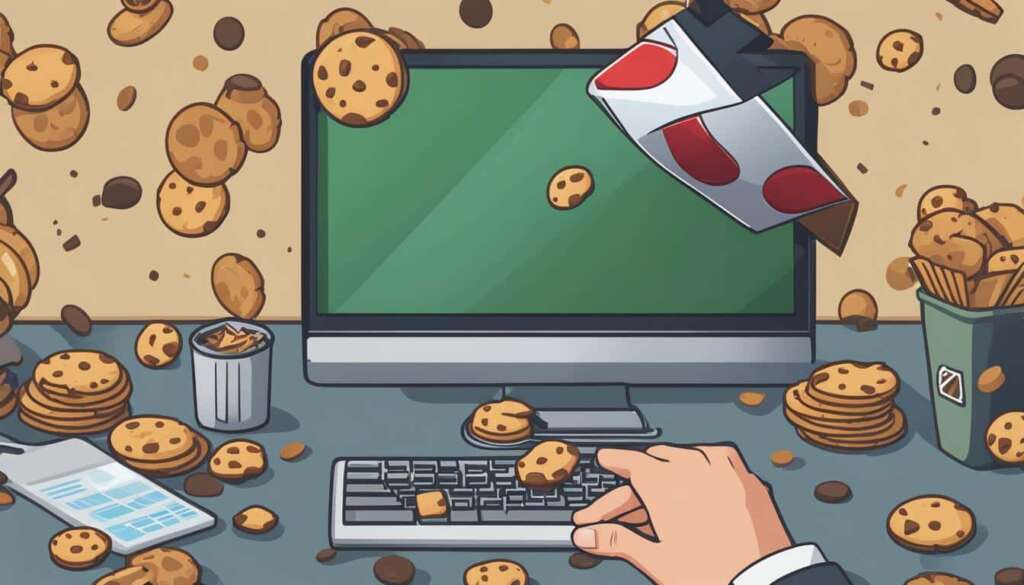Table of Contents
The cache and cookies stored on your computer can accumulate over time, causing performance and privacy issues. In this guide, you will learn how to clear the cache on popular browsers like Google Chrome, Mozilla Firefox, and Microsoft Edge. We will also explore how to clear the system cache on Windows, macOS, and Linux, as well as the importance of regularly clearing cookies for enhanced security. By following these steps, you can optimize your computer’s performance and ensure a smoother online experience.
Key Takeaways
- Regularly clearing cache and cookies on your computer is essential for optimizing performance and enhancing security.
- Clear cache on popular browsers such as Google Chrome, Mozilla Firefox, and Microsoft Edge to improve browsing speed and address privacy concerns.
- Clear system cache on Windows, macOS, and Linux to free up storage space and improve system responsiveness.
- Clearing cookies helps protect your personal information online and reduces the risk of identity theft and financial fraud.
- Follow the recommended steps and precautions in this guide to enjoy a lightning-fast and secure computing experience.
What Are Caches and Cookies?
Caches and cookies are essential components of web browsing that play a crucial role in enhancing performance and storing temporary data. Understanding their functions and impact is key to optimizing your online experience.
Caches: Browser caches are like temporary storage areas that store data from websites you visit. When you revisit a website, your browser retrieves files and data from the cache instead of downloading them again. This speeds up loading times and reduces the amount of data transferred over the internet.
Cookies: Cookies are small text files that websites save to your computer. They contain information such as login credentials, preferences, and browsing history. Cookies help websites remember you and provide personalized experiences. For example, they can remember items in your shopping cart or keep you logged in between sessions.
“Caches and cookies are like a bookmark and a notepad for your browser.”
While caches and cookies offer convenience, they can also lead to performance and privacy issues if not managed properly. Caches can accumulate and take up valuable storage space over time, potentially slowing down your browser. Meanwhile, cookies can track your online activities and collect personal information, raising privacy concerns.
Next, we will delve into the various methods of clearing caches and cookies on popular browsers and operating systems.
How to Clear Cache and Cookies on Google Chrome
Clearing cache and cookies on Google Chrome is essential for maintaining optimal performance and addressing privacy concerns. By regularly clearing these data, you can ensure a smoother browsing experience and protect your personal information. Here’s a step-by-step guide on how to clear cache and cookies on Google Chrome:
- Open Google Chrome and click on the three dots located at the top right corner of the browser window.
- Select “More tools” from the dropdown menu, then click on “Clear browsing data”.
- A new tab will open with the “Clear browsing data” popup. Here, you can choose the time range for which you want to clear the data. If you want to clear everything, select “All time”.
- Check the box next to “Cookies and other site data” and “Cached images and files”. You can also select additional data types you want to clear.
- Click on the “Clear data” button to initiate the clearing process.
Once the process is complete, cache and cookies will be cleared from your Google Chrome browser. This will optimize performance, free up storage space, and address any privacy concerns.
Why Clearing Cache and Cookies is Important
Clearing cache and cookies on Google Chrome is important for several reasons. Firstly, it helps improve the performance of the browser by removing stored data that can slow down loading times. Secondly, it enhances privacy by deleting cookies that may contain personal information. Lastly, regularly clearing cache and cookies ensures that you are always browsing with the latest version of websites, reducing the chances of encountering errors or outdated content.
The Impact of Clearing Cache and Cookies
Clearing cache and cookies on Google Chrome can have a positive impact on your browsing experience. By removing unnecessary data, you can enjoy faster loading times, smoother navigation, and improved website functionality. Additionally, clearing cookies can help protect your privacy and prevent unauthorized tracking or data collection. It’s recommended to clear cache and cookies regularly to maintain the optimal performance and security of your Google Chrome browser.
How to Clear Cache and Cookies on Mozilla Firefox
Clearing cache and cookies on Mozilla Firefox is a crucial step in maintaining your privacy and security while browsing the web. By regularly removing cached web content from your browser, you can prevent unauthorized access to your personal information and ensure a faster and smoother browsing experience.
To clear cache and cookies on Mozilla Firefox, follow these simple steps:
- Open Mozilla Firefox and click on the menu button (three horizontal lines) located in the top-right corner of the browser window.
- In the dropdown menu, select “Options”.
- Within the “Options” menu, click on the “Privacy & Security” tab in the left-hand sidebar.
- Scroll down to the “Cookies and Site Data” section and click on the “Clear Data” button.
- A window will pop up with options to clear your cookies and site data. Make sure the “Cookies and Site Data” checkbox is selected and uncheck any other data you want to keep. Then, click on the “Clear” button.
- Wait for the clearing process to complete, and once finished, close the “Options” menu.
By following these steps, you can effectively clear cache and cookies on Mozilla Firefox, protecting your privacy and improving your browsing performance. It is recommended to perform this action regularly or whenever you notice any unusual browser behavior or privacy concerns.

Why Clear Cached Web Content?
Clearing cache on Mozilla Firefox is essential for maintaining your privacy and security. Cached web content can contain sensitive information, including login credentials and browsing history, that can be exploited by malicious actors. By regularly clearing your cache, you reduce the risk of unauthorized access to your personal data and enhance your online privacy.
In addition to privacy and security benefits, clearing cache on Mozilla Firefox also helps in optimizing your browsing experience. When you visit a website, certain resources like images, scripts, and stylesheets are stored in the browser’s cache to load them faster when you revisit the same site. However, an excessive accumulation of cached content can slow down your browser and impact its performance.
By clearing cache and cookies on Mozilla Firefox, you can ensure that you’re accessing the latest version of a website and enjoying a smoother browsing experience. It also helps in troubleshooting issues related to outdated or corrupt cache files that may cause website errors or unexpected behavior.
Summary
Clearing cache and cookies on Mozilla Firefox is a straightforward process that can significantly enhance both your privacy and browsing performance. By following the steps outlined above, you can remove cached web content, protect your sensitive information, and enjoy a faster, more secure online experience.
| Benefits of Clearing Cache and Cookies on Mozilla Firefox | How to Clear Cache and Cookies on Mozilla Firefox |
|---|---|
| 1. Protects privacy and security | 1. Open Mozilla Firefox and click on the menu button |
| 2. Improves browsing performance | 2. Select “Options” from the dropdown menu |
| 3. Ensures access to the latest website version | 3. Go to the “Privacy & Security” tab |
| 4. Troubleshoots website errors | 4. Click on the “Clear Data” button |
| 5. Select “Cookies and Site Data” checkbox and click “Clear” | |
| 6. Wait for the clearing process to complete | |
| 7. Close the “Options” menu |
How to Clear Cache and Cookies on Microsoft Edge
Clearing cache and cookies on Microsoft Edge is a crucial step in optimizing your browsing experience and protecting your privacy. By removing cached data and stored cookies, you can ensure that your browser runs smoothly and that your personal information remains secure.
To clear cache and cookies on Microsoft Edge, follow these simple steps:
- Open the Microsoft Edge browser on your computer.
- Click on the three-dot menu icon at the top right corner of the browser window.
- Select “Settings” from the dropdown menu.
- In the Settings menu, click on “Privacy, search, and services” in the left sidebar.
- Under the “Clear browsing data” section, click on “Choose what to clear”.
- Ensure that the checkboxes for “Cookies and other site data” and “Cached images and files” are selected.
- Click on the “Clear” button to remove the selected data.
By following these steps, you can clear cache and cookies on Microsoft Edge, including saved website data, cached data, and files. This process helps improve performance, resolves website-related issues, and protects your privacy while using the browser.
Remember to regularly clear cache and cookies on Microsoft Edge to maintain optimal browsing speed and security.
Why Is It Important to Clear Cookies?
Clearing cookies regularly is of paramount importance in maintaining the privacy and security of your personal information online. Cookies are small text files that websites store on your computer to remember your preferences and track your browsing activity. While cookies can provide convenience and personalized experiences, they can also pose risks to your digital footprint and expose sensitive data.
By clearing cookies, you can minimize the chances of unauthorized access to your personal information. Malicious actors may attempt to exploit stored cookies to extract login credentials, browsing history, and other sensitive details. Clearing cookies helps reduce the risk of identity theft, financial fraud, and online tracking.
“Clearing cookies regularly ensures that your online presence remains secure and your personal information stays protected.”
Furthermore, clearing cookies enhances your privacy by erasing traces of your online activities. Websites often use cookies to track your behavior for targeted advertising and analytics purposes. If you value your privacy and want to limit the information collected about you, regularly clearing cookies is crucial.
Lastly, clearing cookies can also help resolve technical issues related to website functionality. Outdated or corrupt cookies can disrupt website performance and cause errors. By clearing cookies, you can start with a clean slate and troubleshoot any website-related problems you may encounter.
Overall, the importance of clearing cookies cannot be overstated. It safeguards your privacy, protects your personal information, and ensures a more secure and enjoyable online experience. Remember to follow the steps outlined in this guide to clear cookies effectively and maintain control over your digital presence.
Table: Risks of Saving Cookies
| Risk | Description |
|---|---|
| Data Exploitation | Saving cookies can expose your login credentials and personal information to malicious actors, leading to identity theft and financial fraud. |
| Privacy Concerns | Cookies can track your online activities and be used for targeted advertising, compromising your privacy and leaving a digital footprint. |
| Security Vulnerabilities | Stored cookies can be vulnerable to attacks, compromising the security of your data and exposing you to various threats. |
| Outdated Data | Outdated or invalid cookies can cause browser errors and unexpected behavior, affecting your browsing experience. |
Clearing cookies mitigates these risks, ensuring a safer and more secure browsing experience without compromising your privacy and personal information.
Risks of Saving Cookies
While saving cookies may seem convenient for quick access to websites and personalized settings, it does come with its fair share of risks. Malicious actors are constantly looking for ways to exploit stored data in cookies to gain unauthorized access to personal information and compromise security. By understanding the risks involved, you can make informed decisions about whether to save or clear cookies on your computer.
One of the primary privacy concerns associated with saving cookies is the potential for unauthorized access by malicious actors. Cookies can store sensitive information such as login credentials, browsing history, and personal preferences. If a hacker gains access to these stored cookies, they can extract valuable data, leading to identity theft and financial fraud.
Furthermore, saving cookies can create security vulnerabilities on your computer. Outdated or invalid cookies can be manipulated by attackers, allowing them to execute malicious code that can compromise the security of your system. By clearing cookies, you minimize the risk of falling victim to such attacks and ensure a safer browsing experience.
By regularly clearing cookies, you mitigate the risks of unauthorized access to your personal information and protect your online privacy. It’s a proactive step towards enhancing your digital security and maintaining control over your sensitive data.
Outdated Data and Unexpected Behavior
Another risk of saving cookies is the accumulation of outdated data. As time goes on, cookies can become stale and no longer accurately reflect your preferences or browsing habits. This can result in unexpected behavior on websites or errors in the browser. By regularly clearing cookies, you ensure that you’re working with up-to-date data and reduce the likelihood of encountering these issues.
In conclusion, while saving cookies may offer convenience, it comes with inherent risks to your privacy and security. By clearing cookies regularly, you can mitigate these risks, protect your personal information, and ensure a safer and more reliable browsing experience.
| Risks of Saving Cookies |
|---|
| Unauthorized access by malicious actors |
| Security vulnerabilities |
| Accumulation of outdated data |
| Unexpected behavior on websites |
When Is the Best Time to Clear Cookies?
Clearing cookies can help you tidy up your digital space, enhance online security, and improve your browsing experience. There are several key moments when clearing cookies can be beneficial:
- Before making online purchases: Clearing cookies before making a purchase ensures that your personal information and browsing history associated with previous transactions are not stored, reducing the risk of unauthorized access or targeted advertisements.
- After logging out from websites: Clearing cookies after logging out ensures that any information related to your logged-in sessions, such as usernames or preferences, is removed, protecting your privacy and preventing potential security breaches.
- When troubleshooting websites: If you encounter issues with a website, clearing cookies can help resolve them. Outdated or corrupted cookies can lead to errors or prevent proper functionality, and clearing them allows the website to create fresh cookies and potentially resolve the problem.
- Before switching devices: When you switch devices, such as from your laptop to your smartphone, clearing cookies ensures that no sensitive information or browsing history is transferred between devices, contributing to a fresh start and maintaining the security of your data.
- To speed up your PC: Clearing cookies can free up storage space and improve the performance of your computer. Over time, accumulated cookies can consume valuable resources, and removing them can help optimize your system’s speed and responsiveness.
By clearing cookies at these strategic moments, you can enjoy a more secure and efficient online experience. Take control of your digital footprint and protect your privacy by regularly tidying up your cookies.

“Clearing cookies at the right time is crucial for maintaining online privacy and maximizing browsing efficiency.”
Clearing System Cache for Windows
Clearing the system cache on Windows is an important step to optimize performance and free up storage space. The system cache consists of temporary files that are stored in various locations on your computer, including the temp folder and prefetch folder.
The temp folder is used to store temporary files that are created by different programs and processes. These files can accumulate over time and take up valuable space on your hard drive. Clearing the temp folder not only frees up storage space but also helps improve system responsiveness.
The prefetch folder, on the other hand, contains data that is used to optimize the startup process of your computer and improve the performance of frequently used applications. However, over time, this folder can become bloated with unnecessary data, causing slower startup times and decreased overall performance. Clearing the prefetch folder can help resolve these issues and ensure a faster and more efficient computing experience.
To clear the system cache on Windows, you can manually delete the files in the temp folder and prefetch folder. Here are the steps:
- Navigate to the temp folder by opening the Run dialog (press Windows key + R), typing %temp%, and pressing Enter.
- Select all the files and folders in the temp folder and delete them.
- To clear the prefetch folder, open the Run dialog again, type prefetch, and press Enter.
- Select all the files and folders in the prefetch folder and delete them.
By following these steps, you can effectively clear the system cache on Windows, improve system performance, and ensure a smoother computing experience.
Clearing System Cache for macOS and Linux
Clearing the system cache on macOS and Linux is a crucial step in optimizing performance and maintaining a smooth computing experience. By removing unnecessary cache files, you can free up storage space, improve system responsiveness, and ensure reliable operation of your operating system.

Clearing System Cache on macOS
On macOS, cache files are stored in the Library/Caches folder. To clear the system cache, navigate to this folder and delete the cache files associated with the applications or processes causing performance issues. Be cautious when deleting cache files, as some may be required for specific applications to function properly.
Clearing System Cache on Linux
On Linux, cache locations may vary depending on the distribution and desktop environment you are using. Common cache locations include /var/cache and /home//.cache. To clear the system cache, you can use the ‘rm’ command followed by the cache file or folder path. Exercise caution when using the ‘rm’ command to avoid deleting essential system files.
| Operating System | Cache Locations | Cache Clearing Method |
|---|---|---|
| macOS | Library/Caches | Delete cache files manually |
| Linux | /var/cache, /home//.cache | Use ‘rm’ command to delete cache files |
Clearing the system cache on macOS and Linux is an effective way to optimize system performance and improve the overall efficiency of your computer. Remember to exercise caution and only delete cache files that are safe to remove. By regularly clearing the system cache, you can enjoy a smoother and more responsive computing experience.
Conclusion
Clearing cache on your computer is essential for optimising performance, enhancing security, and ensuring a smoother computing experience. By regularly clearing cache and cookies on your preferred browser, as well as the system cache on your operating system, you can free up storage space, improve speed, and protect your privacy.
Clearing cache and cookies on popular browsers like Google Chrome, Mozilla Firefox, and Microsoft Edge helps address performance and privacy issues. It removes stored data from visited websites and applications, preventing them from accumulating and impacting browser performance.
Additionally, regularly clearing cookies is crucial for maintaining the privacy and security of your personal information online. Cookies can store sensitive data, such as login credentials and browsing history, which can be exploited by malicious actors. By clearing cookies, you reduce the risk of identity theft, financial fraud, and unauthorized access to your personal information.
Don’t forget to follow the recommended steps and precautions outlined in this guide for the best results. By clearing cache, optimising performance, and enhancing security, you can enjoy a lightning-fast and secure computing experience. Take control of your digital space and unlock the full potential of your computer!
FAQ
What are caches and cookies?
Caches and cookies are temporary storage files that your web browser uses to store data from visited websites and applications. Caches help improve loading times for frequently accessed content, while cookies store data such as login credentials and browsing history.
How do I clear cache and cookies on Google Chrome?
To clear cache and cookies on Google Chrome, go to the browser’s settings, select the “Clear browsing data” option, choose the time range, and select the types of data you want to remove.
How do I clear cache and cookies on Mozilla Firefox?
In Mozilla Firefox, go to the browser’s settings, find the “Privacy & Security” section, select “Clear Data,” and choose the types of data you want to clear, including cookies and cached web content.
How do I clear cache and cookies on Microsoft Edge?
To clear cache and cookies on Microsoft Edge, access the browser’s settings, choose “Clear browsing data,” and select the types of data you want to clear, such as cookies and cached data.
Why is it important to clear cookies?
Clearing cookies regularly is important for maintaining the privacy and security of your personal information online. Cookies can store sensitive data that can be exploited by malicious actors, making it crucial to regularly clear them to reduce the risk of identity theft and unauthorized access.
What are the risks of saving cookies?
Saving cookies can pose risks to your privacy and security. Malicious actors can use stored data in cookies to extract login credentials and personal information, leading to identity theft and financial fraud. Additionally, cookies can be vulnerable to attacks that compromise data security.
When is the best time to clear cookies?
It is recommended to clear cookies before making online purchases, after logging out from websites, when troubleshooting issues with websites, before using another device to surf the internet, and when you want to improve the performance and privacy of your web browser.
How do I clear the system cache on Windows?
To clear the system cache on Windows, you can delete temporary files stored in the temp folder, prefetch folder, and other cache locations specific to your Windows operating system.
How do I clear the system cache on macOS and Linux?
On macOS, you can access the Library/Caches folder and delete cache files. On Linux, cache locations may vary depending on the distribution and desktop environment, but common cache locations include /var/cache and /home//.cache. Use the rm command to remove cache files.













